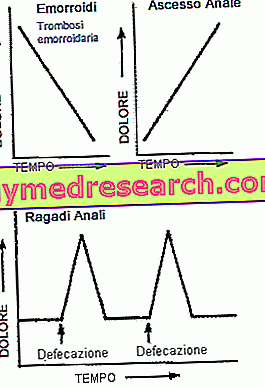Irritable bowel syndrome (SII) is a widespread disorder characterized by: abdominal pain / discomfort, swelling, flatulence and alterations of the alvus and fecal consistency; it is more widespread in women and in the West it has a prevalence of 5-10%.

In people who already suffer from irritable bowel syndrome, the symptomatic manifestation of lactose intolerance (IL) is significantly greater; furthermore, since these are two very common pathologies and some clinical signs and / or "overlapping" symptoms, carrying out the differential diagnosis is not a simple path.
Diagnosis of irritable bowel VS diagnosis of lactose intolerance
While for the diagnosis of the irritable bowel, due to the absence of objective physical exams, it is necessary to exclusively evaluate the patient's references (diagnostic criteria and " Roma III 2006" test) *, in the diagnosis of lactose intolerance it is possible ( and in this case IT IS NECESSARY to carry out a specific test, the Breath test (measurement of exhaled hydrogen). Ultimately, the breath test is the only analysis that allows us to distinguish coexistence ( overlap or comorbidity) between abdominal symptoms of lactose intolerance and that of the irritable colon.
It is obvious and known that those who are positive for the Breath test, and therefore intolerant, must follow a diet with a low lactose content to reduce symptoms; but in case of coexistence with irritable bowel syndrome, will the results of a similar nutritional therapy be the same?
Response of lactose-excluded therapy in lactose intolerant with irritable bowel syndrome
To evaluate the improvement of abdominal symptoms in lactose intolerant and the possible correlations with the symptoms of irritable bowel syndrome, dietitians Chiara Razzolini and Carla Dini carried out an experimental analytical study.
The research sample is 27 subjects lactose intolerant and positive for the Breath test; were followed for 3 follow-ups (meetings): at time 0, after 15 days and after 45 days, in order to assess compliance (adherence) to the diet with low lactose content (between 0.5 and 1.5 g daily, administered at the first visit) and any reduction in symptoms.
Through the use of the Rome III 2006 questionnaire, the dietitians evaluated the presence of irritable bowel syndrome; of the 27 subjects, 18 are positive:
- 9 with diarrhea
- 4 with constipation
- 5 with diarrhea and constipation.
In contrast, of the 27 only 7 were found to be affected by ONLY lactose intolerance and 2 were excluded (dropout) at the first check because they complained of atypical disorders, ie only CEFALEA, and not abdominal.
The complaints complained of [with greater onset after meals (15 '/ 3h)] by the patients remaining in observation were: swelling, diarrhea, meteorism, abdominal pain, constipation, nausea, headache and stomach acid; with the exclusion of lactose from the diet, many subjects reported a general improvement in symptoms, with the exception of some occasional disorders related to the transgression of dietary rules imposed by the diet. On the other hand, there were 10 patients who did NOT DECLARE the symptoms (of which 8 with irritable bowel and 2 without). This means that lactose intolerance, although present, is not necessarily the agent that triggers abdominal disorders but (probably) could coexist with an irritable bowel syndrome responsible for the symptoms.
Conclusion
Ultimately, it is obvious that the exclusion of lactose from the diet (and the consequent reduction in food calcium) does NOT make sense IF NOT in the presence of clinical evidence (Breath test), but also in this case, although most of the population can take advantage of the exclusion of lactose (60% of the sample analyzed), another good slice could continue to show abdominal symptoms due to overlap with irritable bowel syndrome (32% of the sample analyzed).
NB . More than half of the cases observed showed a strong link between stressful daily events and inadequate diet, as if at the level of individual perception this represented the trigger for the disorders.
- All lactose intolerant but without irritable bowel subjects responded positively to treatment (except those with headache), while in those with irritable bowel, only slightly more than half benefited from the exclusion of lactose.
This should lead clinicians and food professionals to reduce the importance of the lactose dose in positive subjects who do NOT improve with the exclusion of the latter; in this case, it is very likely that the aetiological agent of abdominal symptoms is an overlap with irritable bowel syndrome (coexistence of the two disorders). By loosening the lactose restriction it would therefore be possible to favor the dietary balance, normalize the intake of essential nutrients such as calcium, avoid hypovitaminosis and insufficiency in the supply of mineral salts, and avoid an excessive restriction in the food choices of patients.
Bibliography :
- Lactose intolerance: valence of irritable bowel syndrome on the effectiveness of diet therapy - Chiara Razzolini, Carla Dini, dietitian - Journal of the National Dietitian Association - twenty-first year, number two, bi-monthly period II ° two months 2012 - pag20: 22 .



